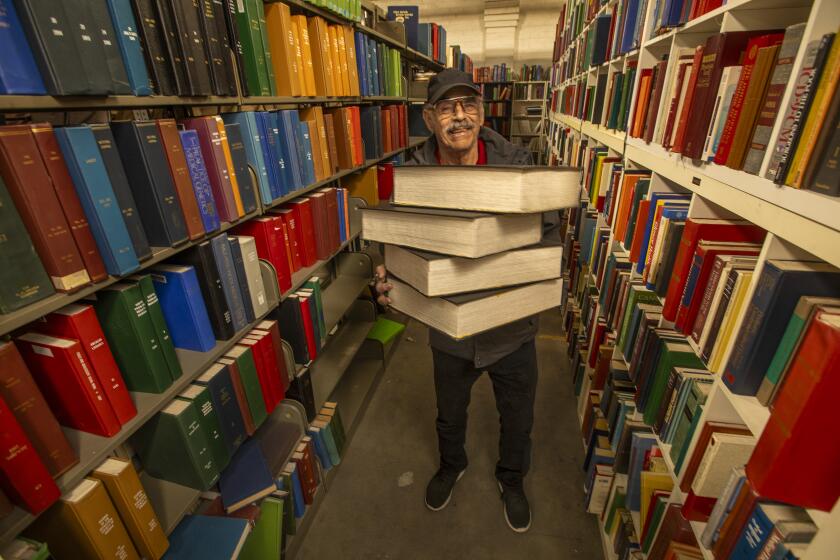Longtime prop house owner Marc Meyer always imagined he would die in his office chair. That one day, someone would find him slumped over his desk, surrounded by his life’s work.
Last week, that desk — a vintage Monteverdi Young piece from 1963 with an 11-foot back credenza and built-in ink blotter — was buried under bills and bright yellow sticky notes.
Very much alive, Meyer leaned back in his office chair and answered a call from his landlord, who he said had recently informed him that he had until the end of the week to fork over $100,000 or vacate the premises and surrender everything inside.
In a New Year’s miracle, Meyer was able to make some last-minute prop sales and scrape together enough money — $45,000 — to satisfy the landlord and buy himself another month on the property. Now, he and his industry allies are on a mission to raise $100,000 by Feb. 1 and save his business.
Meyer’s Faux Library Studio Props — which provides fake books, real books, antique furniture and other decor for film and TV sets — is among a number of Southern California prop houses that were still recovering from the COVID-19 pandemic when Hollywood actors and writers went on strike in 2023, bringing filming to a near standstill.
Read more: L.A. prop houses prepare for the return of production after dual Hollywood strikes
After laying off staff, slashing salaries and tapping new revenue sources to get by, several prop houses are busy rebuilding and prepping for the return of production now that Hollywood’s season of strikes is over.
Others, such as Sony Pictures’ prop house in Culver City, didn’t survive.
Faux Library, which has been around for 24 years, was hard hit by the work stoppages, forcing Meyer to lay off 11 of his 13 employees and miss several rent payments. As of last Tuesday, Meyer estimated that he owed his landlord about $500,000.
“I’ve heard from set decorators — some of them I haven’t heard from in 10 years. … They’re all up in arms,” Meyer said. “They say, ‘My God, this is a source that we can’t live without.’ … It hurts my feelings that it’s come to this.”
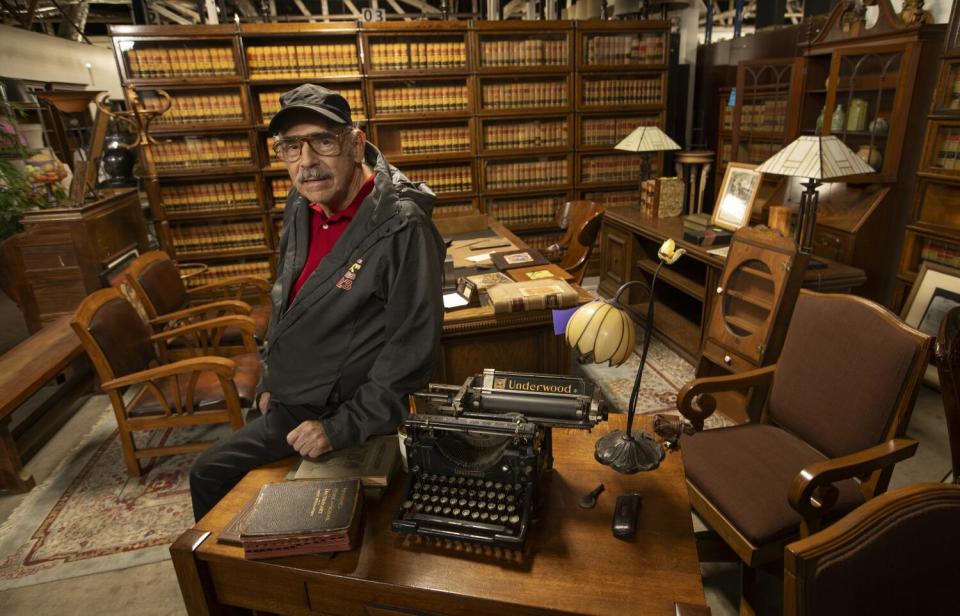

At least two of those set decorators and another prop house owner credited Meyer — a 75-year-old former set decorator whose credits include the 1980 Olivia Newton-John musical “Xanadu” and the 1970s detective series “Switch” — with inventing the fake book.
After watching in horror as crew members risked their safety by scaling ladders with their arms full of hardcovers to dress a 14-foot bookcase on the set of Steven Spielberg’s “High Incident” in the early 1990s, Meyer had an epiphany.
“I just said, ‘We’ve gotta do lighter books. There’s gotta be an easier way to do this,'” Meyer recalled. “And that’s when I went into my garage, and … decided to start playing around with it.”
Hard at work in his Eagle Rock garage, Meyer ripped out the pages of psychology books — donated by a friend who had just retired from the field — and replaced them with foam. Over the years, he perfected his craft, covering up the exposed foam with striped wallpaper he stumbled upon at Home Depot.
“It looked just like pages,” Meyer said. “And at that very second, I could see [the wallpaper] on the edge of the book. I mean, it was instantaneous. And so I bought like eight of them and brought them back to the shop, and we cut them on the band saw in the width of the books. And then we glued them on, and they looked like a million bucks.”
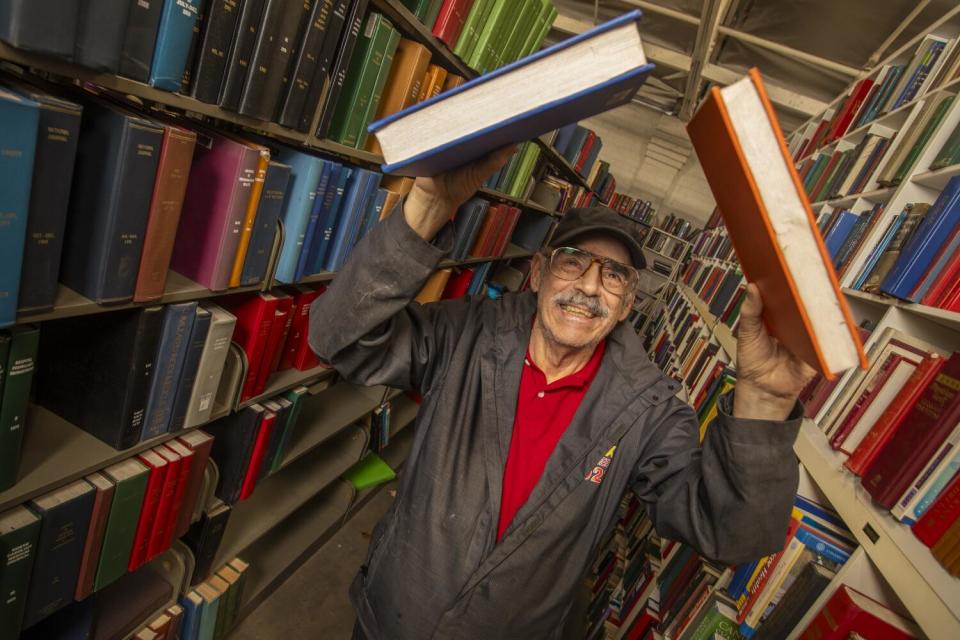

As his collection grew from hundreds to thousands of fake books, Meyer expanded into additional garages and eventually warehouses, officially founding Faux Library in 2000. The business’ current location — an 89,000 square-foot warehouse in North Hollywood — boasts about 16,000 fake books, 4,000 real books (paperbacks are “too hard to hollow,” Meyer explained) and various pieces of rare furniture and decor worth about $6 million total.
Meyer estimated that he personally gutted, stuffed and glued about half of the fake books by hand.
“When you had a whole library to do, instead of having to haul pounds and pounds and pounds of books, you could do faces of the books,” said Susan Benjamin, a set decorator whose credits include “Roswell,” “The Blind Side” and “Saving Mr. Banks.” “That was a game changer for a lot of us.”
Items from Faux Library’s sprawling inventory have appeared in thousands of movies and TV series, including “Angels & Demons,” “Snowfall,” “American Horror Stories,” “Daisy Jones & The Six,” “True Blood,” “The X-Files,” “NCIS” and “Top Gun: Maverick.”
Meyer’s collection of faux books alone cover an astonishing breadth of subjects and titles, ranging from chemistry textbooks and flight-safety manuals to classics such as Leo Tolstoy’s “Anna Karenina” and Arthur Conan Doyle’s “The Adventures of Sherlock Holmes.”
“I’m sure when people watch movies, they think, ‘Oh … they found a bookstore,'” said Pam Elyea, co-owner of nearby prop house History for Hire. “‘You found a lawyer’s office with all those books.’ No, that’s Marc’s stuff.”
Read more: As a Hollywood writers’ strike hobbles production, L.A. businesses brace for ripple effects
Whenever Faux Library doesn’t already have the exact book or piece of furniture required, Meyer will often go out of his way to find it elsewhere — sometimes even purchasing the prop himself and then loaning it to a set decorator who can’t buy it at full price.
“He would do things like that for us,” Benjamin said. “If I had a problem, I could always go to Marc and say, ‘Hey, I really need this, but I’m on a budget,’ or ‘Hey, I’m in Atlanta. Would you mind shipping this stuff?’ And the answer was always ‘yes.'”
Those acts of kindness — renting out entire sets for an extended period of time or covering the cost of an Emmys ticket for a below-the-line nominee who couldn’t afford to go to the ceremony, for example — have earned Meyer a reputation as one of the most helpful and generous prop house owners in the business.
“Marc is an amazing, amazing soul,” said Ron Franco, a set decorator whose credits include “True Blood” and “The X-Files.” “He would give anybody the shirt off his back. … So it’s the saddest thing for our industry to see this prop house possibly go by the wayside.”
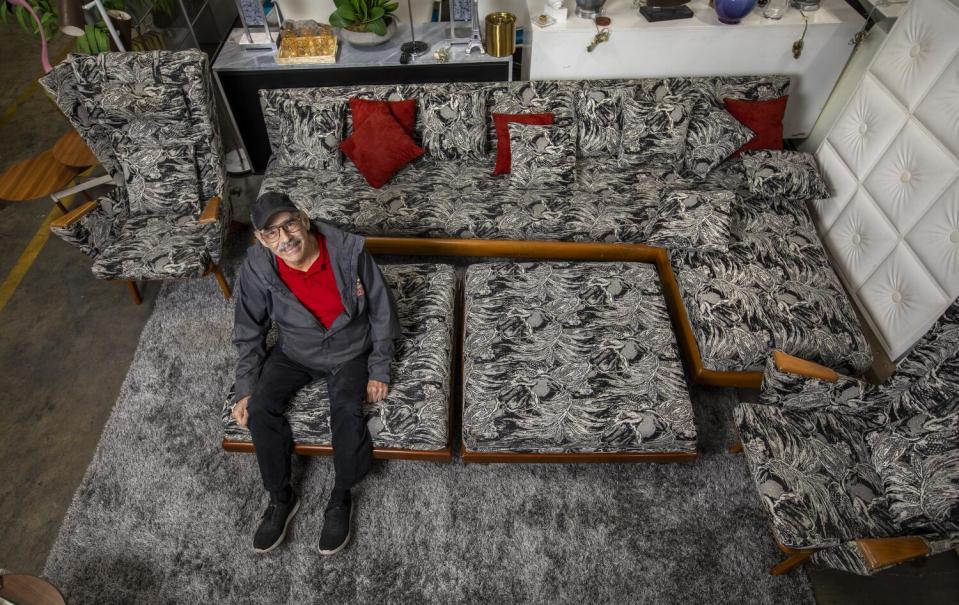

Franco added that many community members have been “coming out of the woodwork” to try to rescue Faux Library in recent weeks, “but nobody has been able to do so because of its value.”
“It hurts me that I can’t help him,” Elyea said. “I could write a check to Marc for $500,000 and cover his rent. And if it were business as normal, I would do that. But I don’t know what’s going to happen this coming year. … I’m really committed to making sure that my staff has a paycheck and has a job, and so that’s what I’m saving for.”
During the strikes, set decorator Mary Ann Biddle and her husband, boom operator John Unsinn, launched a GoFundMe campaign for Faux Library that has amassed more than $16,000. A handful of other friends — including fellow prop-house owner Francisco Ocampo and “Top Gun: Maverick” set decorator Jan Pascale — have stopped by Meyer’s warehouse in recent weeks to purchase some props and hopefully ease his financial burden.
It was mostly thanks to those transactions that Meyer was able to buy an extension from his landlord, who did not respond to requests for comment.
Some of the big-ticket items that Meyer managed to sell for rent money were a “chrome tongue desk” he designed, plus assorted “crystals and things,” to decorate Superman’s fortress for Warner Bros. and DC Studios’ upcoming film “Superman: Legacy,” as well as some office supplies for the Amazon Freevee series “Bosch: Legacy.”
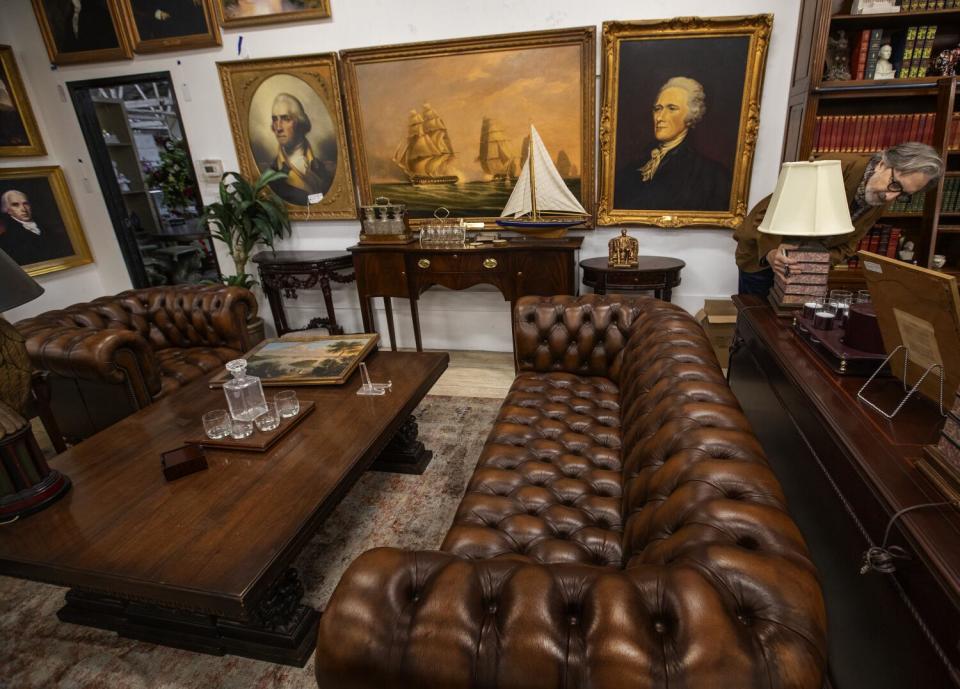

Last Wednesday, Meyer meandered through the seemingly infinite aisles of his warehouse as if taking a stroll down memory lane, pointing out some of his proudest acquisitions: an enormous, sparkling amethyst geode desk from “Jane the Virgin,” the office of a Navy general in “Top Gun: Maverick,” distressed Vatican library books from “Angels & Demons.”
When asked to identify some of his favorite props, Meyer couldn’t choose.
“I’m fond of everything in here because I handpicked every piece,” he said.
“I have a story for every one of these pieces. I know exactly where it came from and who it’s by … It’s the love of the place.”
Returning to his office with his dog and “best friend” Xanadu (Xana for short) in tow, Meyer took his place behind his cherished Monteverdi Young desk and looked toward the uncertain future.
“I don’t know what I’m doing at the end of the week,” he said. “I guess I’m old enough to retire finally, but it just seems like I have so much more life left in me. I don’t know why I should even think about that.”
While Meyer isn’t ready to quit just yet, this experience has forced him to accept that he probably can’t continue running Faux Library on his own forever. As part of his ongoing efforts to salvage his work, he is looking for potential partners to invest in and eventually take over his beloved prop house.
“After this scare,” he said, “I’ve got to get somebody else in here to take the reins.”
This story originally appeared in Los Angeles Times.


